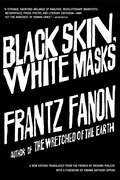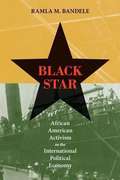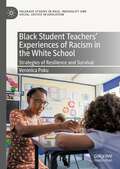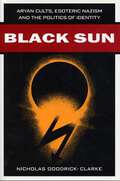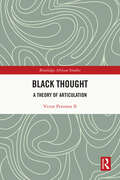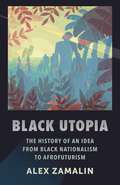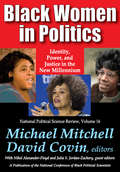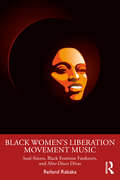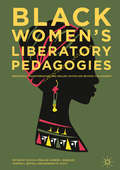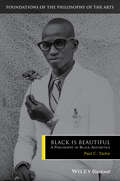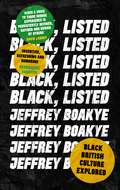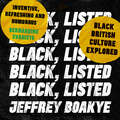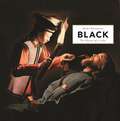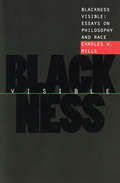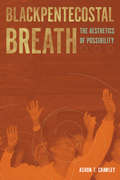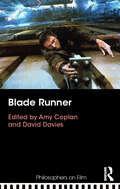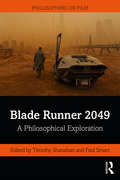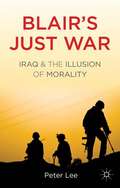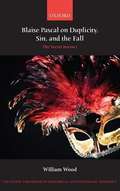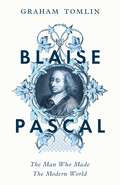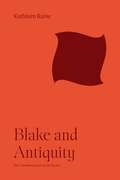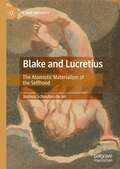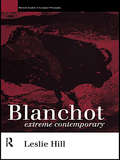- Table View
- List View
Black Skin, White Masks
by Frantz FanonThe new translation of the classic work by the author of Wretched of the Earth: &“A strange, haunting mélange of analysis [and] revolutionary manifesto&” (Newsweek). Few modern voices have had as profound an impact on the black identity and critical race theory as Frantz Fanon, and Black Skin, White Masks represents some of his most important work. This new translation by Richard Philcox makes Fanon&’s masterwork accessible to a new generation of readers. It also includes a foreword by philosopher Kwame Anthony Appiah. A major influence on civil rights, anti-colonial, and black consciousness movements around the world, Black Skin, White Masks is the unsurpassed study of the black psyche in a white world. Hailed for its scientific analysis and poetic grace when it was first published in 1952, the book remains a vital force today from one of the most important theorists of revolutionary struggle, colonialism, and racial difference in history.
Black Star: African American Activism in the International Political Economy
by Ramla M. BandeleThis book describes how the first African American mass political organization was able to gain support from throughout the African diaspora to finance the Black Star Line, a black merchant marine that would form the basis of an enclave economy after World War I. Ramla M. Bandele explores the concept of diaspora itself and how it has been applied to the study of émigré and other ethnic networks. In characterizing the historical and political context of the Black Star Line, Bandele analyzes the international political economy during 1919-25 and considers the black politics of the era, focusing particularly on Marcus Garvey's Universal Negro Improvement Association for its creation of the Black Star Line. She offers an in-depth case study of the Black Star Line as an instance of the African diaspora attempting to link communities and carry out a transnational political and economic project. Arguing that ethnic networks can be legitimate actors in international politics and economics, Bandele also suggests, however, that activists in any given diaspora do not always function as a unit.
Black Student Teachers' Experiences of Racism in the White School: Strategies of Resilience and Survival (Palgrave Studies in Race, Inequality and Social Justice in Education)
by Veronica PokuThis book investigates the racism experienced by Black teacher trainee Post-graduate students whilst on teaching placements in South London primary schools. Using critical race theory as an epistemological lens, the book goes on to explore their experiences in school via testimonies around the gaslighting they were subjected to. Chapters delve into how these students work to fit themselves into the school’s white space at an emotional and psychological cost and addresses the questions these experiences raise for those in charge of PGCE courses and Initial Teacher Education.
Black Students, Middle Class Teachers
by Jawanza KunjufuA compelling look at the relationship between the majority of African American students and their teachers.
Black Sun: Aryan Cults, Esoteric Nazism, and the Politics of Identity
by Nicholas Goodrick-ClarkeA comprehensive and revealing study of the mindset and motives that drive far-right extremists in the post-World War II West.Black Sun examines the new neofascist ideology, showing how hate groups, militias and conspiracy cults gain influence. Based on interviews and extensive research into underground groups, the book documents new Nazi and fascist sects that have sprung up from the 1970s to the 1990s and examines the mentality and motivation of these far-right extremists. The result is a detailed, grounded portrait of the mythical and devotional aspects of Hitler cults among Aryan mystics, racist skinheads and Nazi satanists, and disciples of heavy metal music and occult literature.
Black Thought: A Theory of Articulation (Routledge African Studies)
by Victor Peterson IIThis book uncovers a logical fallacy underlying Afro-Pessimism and provides a formal theory of Articulation, teasing out new reflections on race and Blackness. Afro-Pessimism maintains that Blacks, subject to a subordinate position in society, suffer a cultural death. In this monograph, Victor Peterson rejects this theory, demonstrating that Black subjectivity is inherently multiple, articulating identities appropriate to the contexts in which it finds itself and yet remaining continuous across its individual but not mutually exclusive instantiations. Peterson argues that we should consider the mechanisms that produce the conditions under which individuals obtain positions of either dominance or subordination. By providing a working logical foundation for Articulation theory within cultural studies, Peterson encourages us to rethink the politics of racial identity and subjectivity in contemporary social life. Encouraging critical thought about the arbitrarily determined but instrumentally objective of our global racial order, this book will be of great interest to scholars of Black Studies, sociology, cultural studies, and philosophy.
Black Utopia: The History of an Idea from Black Nationalism to Afrofuturism
by Alex ZamalinWithin the history of African American struggle against racist oppression that often verges on dystopia, a hidden tradition has depicted a transfigured world. Daring to speculate on a future beyond white supremacy, black utopian artists and thinkers offer powerful visions of ways of being that are built on radical concepts of justice and freedom. They imagine a new black citizen who would inhabit a world that soars above all existing notions of the possible.In Black Utopia, Alex Zamalin offers a groundbreaking examination of African American visions of social transformation and their counterutopian counterparts. Considering figures associated with racial separatism, postracialism, anticolonialism, Pan-Africanism, and Afrofuturism, he argues that the black utopian tradition continues to challenge American political thought and culture. Black Utopia spans black nationalist visions of an ideal Africa, the fiction of W. E. B. Du Bois, and Sun Ra’s cosmic mythology of alien abduction. Zamalin casts Samuel R. Delany and Octavia E. Butler as political theorists and reflects on the antiutopian challenges of George S. Schuyler and Richard Wright. Their thought proves that utopianism, rather than being politically immature or dangerous, can invigorate political imagination. Both an inspiring intellectual history and a critique of present power relations, this book suggests that, with democracy under siege across the globe, the black utopian tradition may be our best hope for combating injustice.
Black Women in Politics: Identity, Power, and Justice in the New Millennium (National Political Science Review Series)
by Michael MitchellThe research included in this volume examines the competing pressures felt by black women as political agents in the domains of elections, public policy, and social activism. Their challenges and initiatives are explored in public spaces, institutional behaviours, and public policy.The volume features cutting-edge research exploring black women's political engagement. The first group of contributors interrogates the treatment of black women within the discipline of political science. The second group examines the relationship between cultural politics and policymaking. The third and final group outlines the politics of race-gendered identity and black feminist practice.Black Women in Politics includes chapters on black leadership, radical versus moderate politics in New Orleans, and the Shelby vs. Holder Supreme Court decision. The editors introduce a new series highlighting trends in black politics. Finally, the work notes the passing of William (Nick) Nelson and Hanes Walton, Jr., prominent members of the National Conference of Black Political Scientists.
Black Women's Liberation Movement Music: Soul Sisters, Black Feminist Funksters, and Afro-Disco Divas
by Reiland RabakaBlack Women’s Liberation Movement Music argues that the Black Women’s Liberation Movement of the mid-to-late 1960s and 1970s was a unique combination of Black political feminism, Black literary feminism, and Black musical feminism, among other forms of Black feminism. This book critically explores the ways the soundtracks of the Black Women’s Liberation Movement often overlapped with those of other 1960s and 1970s social, political, and cultural movements, such as the Black Power Movement, Women’s Liberation Movement, and Sexual Revolution. The soul, funk, and disco music of the Black Women’s Liberation Movement era is simultaneously interpreted as universalist, feminist (in a general sense), and Black female-focused. This music’s incredible ability to be interpreted in so many different ways speaks to the importance and power of Black women’s music and the fact that it has multiple meanings for a multitude of people. Within the worlds of both Black Popular Movement Studies and Black Popular Music Studies there has been a long-standing tendency to almost exclusively associate Black women’s music of the mid-to-late 1960s and 1970s with the Black male-dominated Black Power Movement or the White female-dominated Women’s Liberation Movement. However, this book reveals that much of the soul, funk, and disco performed by Black women was most often the very popular music of a very unpopular and unsung movement: The Black Women’s Liberation Movement. Black Women’s Liberation Movement Music is an invaluable resource for students, teachers, and researchers of Popular Music Studies, American Studies, African American Studies, Critical Race Studies, Gender Studies, and Sexuality Studies.
Black Women's Liberatory Pedagogies: Resistance, Transformation, and Healing Within and Beyond the Academy
by Olivia N. Perlow Durene I. Wheeler Sharon L. Bethea BarBara M. ScottThis interdisciplinary anthology sheds light on the frameworks and lived experiences of Black women educators. Contributors for this anthology submitted works from an array of academic disciplines and learning environments, inviting readers to bear witness to black women faculty's classroom experiences, as well as their pedagogical approaches both inside and outside of the higher education classroom that have fostered transformative teaching-learning environments. Through this multidimensional lens, the editors and contributors view instruction and learning as a political endeavor aimed at changing the way we think about teaching, learning. and praxis.
Black is Beautiful: A Philosophy of Black Aesthetics
by Paul C. TaylorBlack is Beautiful identifies and explores the most significant philosophical issues that emerge from the aesthetic dimensions of black life, providing a long-overdue synthesis and the first extended philosophical treatment of this crucial subject. The first extended philosophical treatment of an important subject that has been almost entirely neglected by philosophical aesthetics and philosophy of art Takes an important step in assembling black aesthetics as an object of philosophical study Unites two areas of scholarship for the first time - philosophical aesthetics and black cultural theory, dissolving the dilemma of either studying philosophy, or studying black expressive culture Brings a wide range of fields into conversation with one another- from visual culture studies and art history to analytic philosophy to musicology - producing mutually illuminating approaches that challenge some of the basic suppositions of each Well-balanced, up-to-date, and beautifully written as well as inventive and insightful
Black, Listed: Black British Culture Explored
by Jeffrey BoakyeAFRO-CARIBBEAN. COLOURED. ETHNIC MINORITY. IMMIGRANT. BAME. URBAN. WOKE. FAM. BLACK.These are just some of the terms being wrestled with in Black, Listed, an exploration of twenty-first century Black identity told through a list of insults, insights and everything in between. Taking a panoramic look at global Black history and contemporary culture, this book investigates the ways in which Black communities (and individuals) have been represented, oppressed, mimicked, celebrated and othered. Part autobiographical musing, part pop culture vivisection, it's a comprehensive attempt to make sense of blackness from the vantage point of the hilarious and insightful psyche of Jeffrey Boakye. PRAISE FOR BLACK, LISTED: 'This book gives a voice to those whose experience is persistently defined, refined and denied by others' David Lammy, Guardian 'A panoramic exploration of black identity' Elle'Urgent, timely reading' AnOther Magazine 'Inventive, refreshing and humorous' Bernardine Evaristo, author of Girl, Woman, Other 'A truly radical book, which manages to be unflinching and constantly entertaining' Caroline Sanderson, The Bookseller
Black, Listed: Black British Culture Explored
by Jeffrey BoakyeGUARDIAN MUST READ BOOKS OF 2019 FINANCIAL TIMES BOOKS TO READ 2019 NEW STATESMAN MUST READS 2019'A truly radical book, which manages to be unflinching and constantly entertaining' CAROLINE SANDERSON, THE BOOKSELLER BOOK OF THE MONTH APRIL 2019'This book gives a voice to those whose experience is persistently defined, refined and denied by others' DAVID LAMMY, GUARDIAN *Who is a roadman really? What's wrong with calling someone a 'lighty'? Why do people think black guys are cool?These are just some of the questions being wrestled with in Black, Listed, an exploration of 21st century black identity told through a list of insults, insights and everything in-between.Taking a panoramic look at global black history, interrogating both contemporary and historical culture, Black, Listed investigates the ways in which black communities (and individuals) have been represented, oppressed, mimicked, celebrated, and othered. Part historical study, part autobiographical musing, part pop culture vivisection, it's a comprehensive attempt to make sense of blackness from the vantage point of the hilarious and insightful psyche of Jeffrey Boakye. Along the way, it explores a far reaching range of social and cultural contexts, including but not limited to, sport, art, entertainment, politics, literature, history, music, theatre, cinema, education and criminal justice, sometimes at the same time.
Black: The History of a Color
by Michel PastoureauThe story of the color black in art, fashion, and culture—from the beginning of history to the twenty-first centuryBlack—favorite color of priests and penitents, artists and ascetics, fashion designers and fascists—has always stood for powerfully opposed ideas: authority and humility, sin and holiness, rebellion and conformity, wealth and poverty, good and bad. In this beautiful and richly illustrated book, the acclaimed author of Blue now tells the fascinating social history of the color black in Europe.In the beginning was black, Michel Pastoureau tells us. The archetypal color of darkness and death, black was associated in the early Christian period with hell and the devil but also with monastic virtue. In the medieval era, black became the habit of courtiers and a hallmark of royal luxury. Black took on new meanings for early modern Europeans as they began to print words and images in black and white, and to absorb Isaac Newton's announcement that black was no color after all. During the romantic period, black was melancholy's friend, while in the twentieth century black (and white) came to dominate art, print, photography, and film, and was finally restored to the status of a true color.For Pastoureau, the history of any color must be a social history first because it is societies that give colors everything from their changing names to their changing meanings—and black is exemplary in this regard. In dyes, fabrics, and clothing, and in painting and other art works, black has always been a forceful—and ambivalent—shaper of social, symbolic, and ideological meaning in European societies.With its striking design and compelling text, Black will delight anyone who is interested in the history of fashion, art, media, or design.
Blackness Visible: Essays on Philosophy and Race
by Charles W. MillsCharles Mills makes visible in the world of mainstream philosophy some of the crucial issues of the black experience. Ralph Ellison's metaphor of black invisibility has special relevance to philosophy, whose demographic and conceptual "whiteness" has long been a source of wonder and complaint to racial minorities. Mills points out the absence of any philosophical narrative theorizing and detailing race's centrality to the recent history of the West, such as feminists have articulated for gender domination. European expansionism in its various forms, Mills contends, generates a social ontology of race that warrants philosophical attention.Through expropriation, settlement, slavery, and colonialism, race comes into existence as simultaneously real and unreal: ontological without being biological, metaphysical without being physical, existential without being essential, shaping one's being without being in one's shape. His essays explore the contrasting sums of a white and black modernity, examine standpoint epistemology and the metaphysics of racial identity, look at black-Jewish relations and racial conspiracy theories, map the workings of a white-supremacist polity and the contours of a racist moral consciousness, and analyze the presuppositions of Frederick Douglass's famous July 4 prognosis for black political inclusion. Collectively they demonstrate what exciting new philosophical terrain can be opened up once the color line in western philosophy is made visible and addressed.
Blackpentecostal Breath: The Aesthetics of Possibility (Commonalities)
by Ashon T. CrawleyIn this profoundly innovative book, Ashon T. Crawley engages a wide range of critical paradigms from black studies, queer theory, and sound studies to theology, continental philosophy, and performance studies to theorize the ways in which alternative or “otherwise” modes of existence can serve as disruptions against the marginalization of and violence against minoritarian lifeworlds and possibilities for flourishing.Examining the whooping, shouting, noise-making, and speaking in tongues of Black Pentecostalism—a multi-racial, multi-class, multi-national Christian sect with one strand of its modern genesis in 1906 Los Angeles—Blackpentecostal Breath reveals how these aesthetic practices allow for the emergence of alternative modes of social organization. As Crawley deftly reveals, these choreographic, sonic, and visual practices and the sensual experiences they create are not only important for imagining what Crawley identifies as “otherwise worlds of possibility,” they also yield a general hermeneutics, a methodology for reading culture in an era when such expressions are increasingly under siege.
Blade Runner (Philosophers on Film)
by David Davies Amy CoplanRidley Scott’s Blade Runner is widely regarded as a "masterpiece of modern cinema" and is regularly ranked as one of the great films of all time. Set in a dystopian future where the line between human beings and ‘replicants’ is blurred, the film raises a host of philosophical questions about what it is to be human, the possibility of moral agency and freedom in ‘created’ life forms, and the capacity of cinema to make a genuine contribution to our engagement with these kinds of questions. This volume of specially commissioned chapters systematically explores and addresses these issues from a philosophical point of view. Beginning with a helpful introduction, the seven chapters examine the following questions: How is the theme of death explored in Blade Runner and with what implications for our understanding of the human condition? What can we learn about the relationship between emotion and reason from the depiction of the ‘replicants’ in Blade Runner? How are memory, empathy, and moral agency related in Blade Runner? How does the style and ‘mood’ of Blade Runner bear upon its thematic and philosophical significance? Is Blade Runner a meditation on the nature of film itself? Including a brief biography of the director and a detailed list of references to other writings on the film, Blade Runner is essential reading for students – indeed anyone - interested in philosophy and film studies. Contributors: Colin Allen, Peter Atterton, Amy Coplan, David Davies, Berys Gaut, Stephen Mulhall, C. D. C. Reeve.
Blade Runner 2049: A Philosophical Exploration (Philosophers on Film)
by Timothy Shanahan Paul SmartWidely acclaimed upon its release as a future classic, Denis Villeneuve’s Blade Runner 2049 is visually stunning, philosophically profound, and a provocative extension of the story in Ridley Scott’s Blade Runner. Containing specially commissioned chapters by a roster of international contributors, this fascinating collection explores philosophical questions that abound in Blade Runner 2049, including: What distinguishes the authentically "human" person? How might natality condition one’s experience of being-in-the-world? How might shared memories feature in the constitution of personal identities? What happens when created beings transcend the limits intended in their design? What (if anything) is it like to be a hologram? Can artificial beings participate in genuinely romantic relationships? How might developing artificial economics impact our behaviour as prosumers? What are the implications of techno-human enhancement in an era of surveillance capitalism? Including a foreword by Denis Villeneuve, Blade Runner 2049: A Philosophical Exploration is essential reading for anyone interested in philosophy, film studies, philosophy of mind, psychology, gender studies, and conceptual issues in cognitive science and artificial intelligence.
Blair’s Just War
by Peter LeeBringing together both contemporary and historical just war concepts, Peter Lee shows that Blair's illusion of morality evaporated quickly and irretrievably after the 2003 Iraqinvasion because the ideas Blair relied upon were taken out of their historical context and applied in a global political system where they no longer hold sway.
Blaise Pascal on Duplicity, Sin, and the Fall: The Secret Instinct
by William WoodPascal holds that as fallen selves in a fallen world, human beings have an innate aversion to the truth that is also, at the same time, an aversion to God. According to Pascal, we are born into a duplicitous world that shapes us into duplicitous subjects, and so we find it easy to reject God continually and deceive ourselves about our own sinfulness. Pascal's account of the noetic effects of sin has long been overlooked by theologians, but it is both traditional and innovative.
Blaise Pascal: The Man Who Made the Modern World
by Graham Tomlin'Readable and expert - a brilliant guide to the life and thought of 17th century Europe's supreme polymath'Tom Holland'A richly detailed account of Pascal's life and times, which displays an energetic sympathy for Pascal's startling combination of intellectual precocity and humble faith.'Rory Stewart'A beautiful, accessible account of one of the era's most remarkable lives'Katherine Rundell He lived for just 39 years, yet Blaise Pascal was one of the most remarkable and creative figures of the seventeenth century. He is known for his famous (though often misunderstood) argument 'the Wager', but there's so much more to him than that. Pascal can lay claim to have built an early version of the modern computer, done ground-breaking work in mathematics and geometry, invented urban bus transport and virtually invented probability theory. He also produced one of the most haunting and effective works of Christian apologetics ever written. He is a major intellectual figure at the beginning of the modern age who blends together in his own person and thinking issues that are critical to our age. Blaise Pascal is therefore a crucial figure: not just in the history of European thought, but for how he can shed light on our many contemporary debates.From science to scepticism; mystical experience to distraction; religion to politics, self-love and death, Pascal's thinking was far-reaching. In this captivating biography, Graham Tomlin explores Pascal's short but extraordinary life, and the sweeping impact and relevance of his ideas to the modern world.
Blaise Pascal: The Man Who Made the Modern World
by Graham Tomlin'Readable and expert - a brilliant guide to the life and thought of 17th century Europe's supreme polymath'Tom Holland'A richly detailed account of Pascal's life and times, which displays an energetic sympathy for Pascal's startling combination of intellectual precocity and humble faith.'Rory Stewart'A beautiful, accessible account of one of the era's most remarkable lives'Katherine Rundell He lived for just 39 years, yet Blaise Pascal was one of the most remarkable and creative figures of the seventeenth century. He is known for his famous (though often misunderstood) argument 'the Wager', but there's so much more to him than that. Pascal can lay claim to have built an early version of the modern computer, done ground-breaking work in mathematics and geometry, invented urban bus transport and virtually invented probability theory. He also produced one of the most haunting and effective works of Christian apologetics ever written. He is a major intellectual figure at the beginning of the modern age who blends together in his own person and thinking issues that are critical to our age. Blaise Pascal is therefore a crucial figure: not just in the history of European thought, but for how he can shed light on our many contemporary debates.From science to scepticism; mystical experience to distraction; religion to politics, self-love and death, Pascal's thinking was far-reaching. In this captivating biography, Graham Tomlin explores Pascal's short but extraordinary life, and the sweeping impact and relevance of his ideas to the modern world.
Blake and Antiquity (The A. W. Mellon Lectures in the Fine Arts #11)
by Kathleen RaineThe classic book on William Blake as prophet of the New AgeWilliam Blake (1757–1827) inhabited a remarkable inner world, one that he brought vividly to life in his poetry, painting, and printmaking. Blake and Antiquity situates this brilliant and enigmatic artist within the Western esoteric canon, revealing his indebtedness to Neoplatonism, the Gnostics, alchemy, and astrology. In this book, Kathleen Raine demonstrates how Blake rejected conventional orthodoxy and went in search among the occult traditions of antiquity for symbols that might expand the mind’s awareness into a spiritual state where space, time, and even death are transcended.
Blake and Lucretius: The Atomistic Materialism of the Selfhood (The New Antiquity)
by Joshua Schouten de JelThis book demonstrates the way in which William Blake aligned his idiosyncratic concept of the Selfhood – the lens through which the despiritualised subject beholds the material world – with the atomistic materialism of the Epicurean school as it was transmitted through the first-century BC Roman poet and philosopher Lucretius’ De Rerum Natura. By addressing this philosophical debt, this study sets out a threefold re-evaluation of Blake’s work: to clarify the classical stream of Blake’s philosophical heritage through Lucretius; to return Blake to his historical moment, a thirty-year period from 1790 to 1820 which has been described as the second Lucretian moment in England; and to employ a new exegetical model for understanding the phenomenological parameters and epistemological frameworks of Blake’s mythopoeia. Accordingly, it is revealed that Blake was not only aware of classical atomistic cosmogony and sense-based epistemology but that he systematically mapped postlapsarian existence onto an Epicurean framework.
Blanchot: Extreme Contemporary (Warwick Studies in European Philosophy)
by Leslie HillBlanchot provides a compelling insight into one of the key figures in the development of postmodern thought. Although Blanchot's work is characterised by a fragmentary and complex style, Leslie Hill introduces clearly and accessibly the key themes in his work. He shows how Blanchot questions the very existence of philosophy and literature and how we may distinguish between them, stresses the importance of his political writings and the relationship between writing and history that characterised Blanchot's later work; and considers the relationship between Blanchot and key figures such as Emmanuel Levinas and Georges Bataille and how this impacted on his work. Placing Blanchot at the centre stage of writing in the twentieth century, Blanchot also sheds new light on Blanchot's political activities before and after the Second World War. This accessible introduction to Blanchot's thought also includes one of the most comprehensive bibliographies of his writings of the last twenty years.
